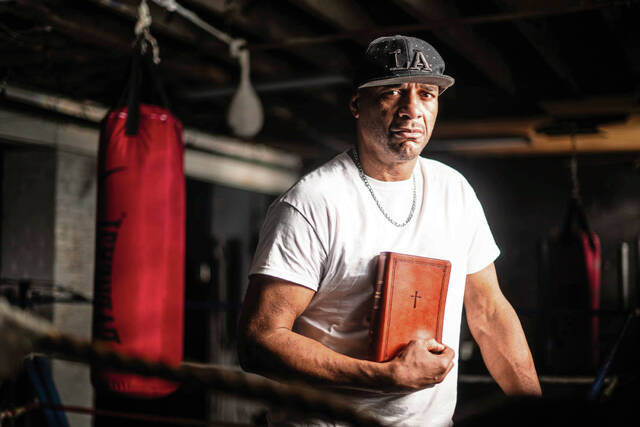Greensburg council this week approved buying body cameras for its police force.
It also will be developing a policy for how they will be used.
When the city receives the cameras, the police department will work with Motorola to install them and expand the computer server that holds police vehicle dashboard camera footage, said Chief Chuck Irvin.
“Once that gets fleshed out, we’ll have to develop a policy for wearing the body-worn cameras, and then get them here, get our officers trained on them and then implement them,” he said. “I don’t have a timeframe. This is the very beginning of that process.”
A state Department of Community and Economic Development grant of $140,000 will pay for the cameras.
Public safety policy management company Lexipol will help the city develop its body-worn camera policy. The company will keep the city up to date on changes in the law that require adjustments to the policy, Irvin said.
Several Westmoreland municipalities have policies in place — including Penn Township, North Huntingdon, Irwin, Murrysville, Latrobe and Ligonier Township. Westmoreland County Park Police distributed cameras to each of its patrol officers in March.
Westmoreland District Attorney Nicole Ziccarelli’s office requested in late December that police departments have prosecutors review footage before it is made public.
Although police departments are not required to submit footage, at least seven municipalities have agreed to Ziccarelli’s request — Penn Township, South Greensburg, Southwest Greensburg, Rostraver, Murrysville, North Huntingdon and Irwin.
Greensburg does not intend to sign an agreement with the District Attorney’s office at this time, Irvin said.
“Obviously, we work very closely with the District Attorney’s office and value their opinion,” Irvin said. “We always coordinate our efforts to determine what is best for each case and will continue to do so.”
For Pitt law professor David Harris, it is most important that municipalities detail in their policies how much the camera and storage systems cost, how the technology operates and when footage can be shared with the public.
“The first thing to remember is that buying into a body-worn camera system is a significant investment of public resources,” he said.
Harris has helped numerous municipalities form body-worn camera policies — including Pittsburgh police, which began investing in the technology in 2019.
A municipality should specify in the policy when the cameras are required to be turned on or turned off and when they may be turned on according to officer discretion, Harris said.
Interactions should be recorded if an officer is investigating or challenging a citizen, making an arrest or running a traffic stop, he said. A provision can be added to specify whether a camera should be turned on in a more casual interaction between an officer and a citizen.
Body-worn camera policies take some time to put together, he said — primarily because of the number of people that should help draft one. An outside expert like Harris, an attorney with the department’s Fraternal Order of Police organization and department leaders are among those that should be involved in the discussion, he said.
State wiretap laws were amended by then-Gov. Tom Wolf in 2017 to allow police departments to use body-worn and vehicle cameras. But another piece of legislation makes it difficult for Pennsylvania residents to get their hands on police video footage.
The requirement that police audio and video recordings be released through a Right-to-Know Law request was removed in 2017, when state officials signed Act 22 into law.
The legislation established a new process for requesting audio and video recordings from law enforcement agencies. Melissa Melewsky, attorney for the Pennsylvania NewsMedia Association, told TribLive in December that there is little public access to footage under Act 22.
Related:
• Greensburg council to vote on body-worn camera grant, event approval processGreensburg’s body-worn camera system may be up and running in three to six months, but the timeline for the project is still up in the air, Irvin said.
“In many circumstances, (body-worn cameras) provide the best evidence of law enforcement encounters, both as a tool for the investigation and prosecution of a crime.
“Additionally, they create transparency,” Irvin said, “because the video record that is created will be part of the discovery process for any court cases and will allow defendants, attorneys, jurors and judges to see exactly what happened in the interaction and from the perspective of the police officer.”
Special events ordinance
Council also approved a special events ordinance, creating a formal approval process for people who want to host events on city property or streets.
Mayor Robb Bell and council members Donnie Zappone Jr. and Sheila Brumley voted in favor of the ordinance. Councilperson Randy Finfrock opposed.
“I just think it would be for streamlining,” Brumley said of the ordinance. “Every department’s on the same page for (the process). That’s how I take it.”
Finfrock said he feels the ordinance is unnecessary and unenforceable.
“I don’t like restricting things that can be done in a policy and a process,” he said. “It also restricts you in making exceptions. The ordinance — it’s this or that, black or white, this and the other, and I like to color outside the lines.”
Councilperson Gregory Mertz was absent from the meeting and did not vote.








